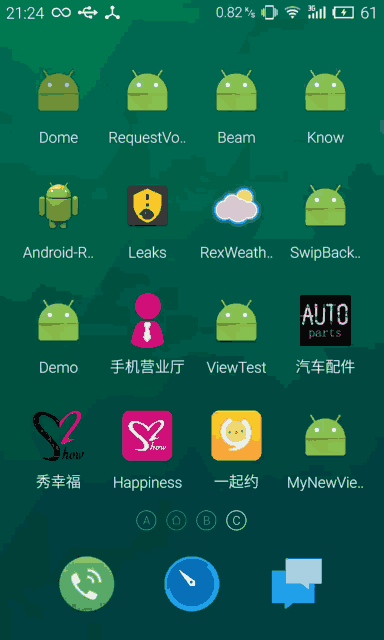Encapsulate many API about RecyclerView into the library,such as arrayAdapter,pull to refresh,auto load more,no more and error in the end,header&footer.
The library uses a new usage of ViewHolder,decoupling the ViewHolder and Adapter.
Adapter will do less work,adapter only direct the ViewHolder,if you use MVP,you can put adapter into presenter.ViewHolder only show the item,then you can use one ViewHolder for many Adapter.
Part of the code modified from Malinskiy/SuperRecyclerView,make more functions handed by Adapter.
compile 'com.jude:easyrecyclerview:4.3.7'#ScreenShot
 #Usage
##EasyRecyclerView
#Usage
##EasyRecyclerView
<com.jude.easyrecyclerview.EasyRecyclerView
android:id="@+id/recyclerView"
android:layout_width="match_parent"
android:layout_height="match_parent"
app:layout_empty="@layout/view_empty"
app:layout_progress="@layout/view_progress"
app:layout_error="@layout/view_error"
app:recyclerClipToPadding="true"
app:recyclerPadding="8dp"
app:recyclerPaddingTop="8dp"
app:recyclerPaddingBottom="8dp"
app:recyclerPaddingLeft="8dp"
app:recyclerPaddingRight="8dp"
app:scrollbarStyle="insideOverlay"//insideOverlay or insideInset or outsideOverlay or outsideInset
app:scrollbars="none"//none or vertical or horizontal
/>Attention EasyRecyclerView is not a RecyclerView just contain a RecyclerView.use 'getRecyclerView()' to get the RecyclerView;
EmptyView&LoadingView&ErrorView
xml:
app:layout_empty="@layout/view_empty"
app:layout_progress="@layout/view_progress"
app:layout_error="@layout/view_error"code:
void setEmptyView(View emptyView)
void setProgressView(View progressView)
void setErrorView(View errorView)then you can show it by this whenever:
void showEmpty()
void showProgress()
void showError()
void showRecycler()scrollToPosition
void scrollToPosition(int position); // such as scroll to topcontrol the pullToRefresh
void setRefreshing(boolean isRefreshing);
void setRefreshing(final boolean isRefreshing, final boolean isCallback); //second params is callback immediately##RecyclerArrayAdapter
there is no relation between RecyclerArrayAdapter and EasyRecyclerView.you can user any Adapter for the EasyRecyclerView,and use the RecyclerArrayAdapter for any RecyclerView.
Data Manage
void add(T object);
void addAll(Collection<? extends T> collection);
void addAll(T ... items);
void insert(T object, int index);
void update(T object, int index);
void remove(T object);
void clear();
void sort(Comparator<? super T> comparator);Header&Footer
void addHeader(ItemView view)
void addFooter(ItemView view) ItemView is not a view but a view creator;
public interface ItemView {
View onCreateView(ViewGroup parent);
void onBindView(View itemView);
}The onCreateView and onBindView correspond the callback in RecyclerView's Adapter,so adapter will call onCreateView once and onBindView more than once;
It recommend that add the ItemView to Adapter after the data is loaded,initialization View in onCreateView and nothing in onBindView.
Header and Footer support LinearLayoutManager,GridLayoutManager,StaggeredGridLayoutManager.
In GridLayoutManager you must add this:
//make adapter obtain a LookUp for LayoutManager,param is maxSpan。
gridLayoutManager.setSpanSizeLookup(adapter.obtainGridSpanSizeLookUp(2));OnItemClickListener&OnItemLongClickListener
adapter.setOnItemClickListener(new RecyclerArrayAdapter.OnItemClickListener() {
@Override
public void onItemClick(int position) {
//position not contain Header
}
});
adapter.setOnItemLongClickListener(new RecyclerArrayAdapter.OnItemLongClickListener() {
@Override
public boolean onItemLongClick(int position) {
return true;
}
});equal 'itemview.setOnClickListener()' in ViewHolder.
if you set listener after RecyclerView has layout.you should use 'notifyDataSetChange()';
###the API below realized by add a Footer。
LoadMore
void setMore(final int res,OnMoreListener listener);
void setMore(final View view,OnMoreListener listener);Attention when you add null or the length of data you add is 0 ,it will finish LoadMore and show NoMore;
also you can show NoMore manually adapter.stopMore();
LoadError
void setError(final int res,OnErrorListener listener)
void setError(final View view,OnErrorListener listener)use adapter.pauseMore() to show Error,when your loading throw an error;
if you add data when showing Error.it will resume to load more;
when the ErrorView display to screen again,it will resume to load more too,and callback the OnLoadMoreListener(retry).
adapter.resumeMore()you can resume to load more manually,it will callback the OnLoadMoreListener immediately.
you can put resumeMore() into the OnClickListener of ErrorView to realize click to retry.
NoMore
void setNoMore(final int res,OnNoMoreListener listener)
void setNoMore(final View view,OnNoMoreListener listener)when loading is finished(add null or empty or stop manually),it while show in the end.
##BaseViewHolder<M>
decoupling the ViewHolder and Adapter,new ViewHolder in Adapter and inflate view in ViewHolder.
Example:
public class PersonViewHolder extends BaseViewHolder<Person> {
private TextView mTv_name;
private SimpleDraweeView mImg_face;
private TextView mTv_sign;
public PersonViewHolder(ViewGroup parent) {
super(parent,R.layout.item_person);
mTv_name = $(R.id.person_name);
mTv_sign = $(R.id.person_sign);
mImg_face = $(R.id.person_face);
}
@Override
public void setData(final Person person){
mTv_name.setText(person.getName());
mTv_sign.setText(person.getSign());
mImg_face.setImageURI(Uri.parse(person.getFace()));
}
}
-----------------------------------------------------------------------
public class PersonAdapter extends RecyclerArrayAdapter<Person> {
public PersonAdapter(Context context) {
super(context);
}
@Override
public BaseViewHolder OnCreateViewHolder(ViewGroup parent, int viewType) {
return new PersonViewHolder(parent);
}
}Now there are three commonly used decoration provide for you.
DividerDecoration
Usually used in LinearLayoutManager.add divider between items.
DividerDecoration itemDecoration = new DividerDecoration(Color.GRAY, Util.dip2px(this,0.5f), Util.dip2px(this,72),0);//color & height & paddingLeft & paddingRight
itemDecoration.setDrawLastItem(true);//sometimes you don't want draw the divider for the last item,default is true.
itemDecoration.setDrawHeaderFooter(false);//whether draw divider for header and footer,default is false.
recyclerView.addItemDecoration(itemDecoration);SpaceDecoration
Usually used in GridLayoutManager and StaggeredGridLayoutManager.add space between items.
SpaceDecoration itemDecoration = new SpaceDecoration((int) Utils.convertDpToPixel(8,this));//params is height
itemDecoration.setPaddingEdgeSide(true);//whether add space for left and right adge.default is true.
itemDecoration.setPaddingStart(true);//whether add top space for the first line item(exclude header).default is true.
itemDecoration.setPaddingHeaderFooter(false);//whether add space for header and footer.default is false.
recyclerView.addItemDecoration(itemDecoration);StickHeaderDecoration
Group the items,add a GroupHeaderView for each group.The usage of StickyHeaderAdapter is the same with RecyclerView.Adapter.
this part is modified from edubarr/header-decor
StickyHeaderDecoration decoration = new StickyHeaderDecoration(new StickyHeaderAdapter(this));
decoration.setIncludeHeader(false);
recyclerView.addItemDecoration(decoration);for detail,see the demo
Copyright 2015 Jude
Licensed under the Apache License, Version 2.0 (the "License");
you may not use this file except in compliance with the License.
You may obtain a copy of the License at
http://www.apache.org/licenses/LICENSE-2.0
Unless required by applicable law or agreed to in writing, software
distributed under the License is distributed on an "AS IS" BASIS,
WITHOUT WARRANTIES OR CONDITIONS OF ANY KIND, either express or implied.
See the License for the specific language governing permissions and
limitations under the License.


